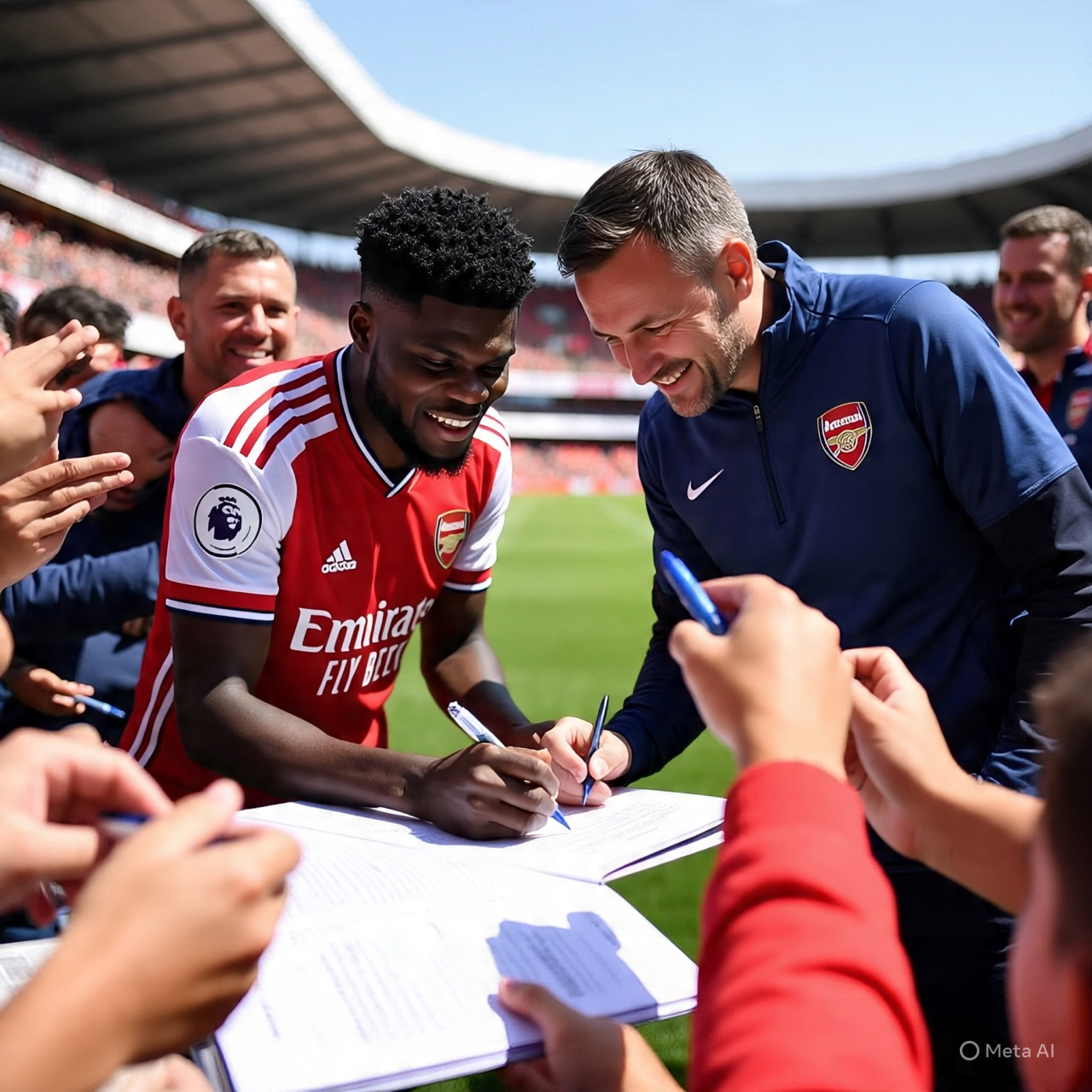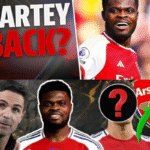Arsenal’s Summer Transfer Revolution: The Partey Departure and Zubimendi Acquisition Saga

The summer of 2025 promises to be a defining period in Arsenal’s recent history, as the club navigates one of the most significant midfield transitions in Mikel Arteta’s tenure as manager. The converging storylines of Thomas Partey’s contractual impasse and Martin Zubimendi’s imminent arrival have created a narrative that encapsulates the modern complexities of elite football transfers, squad planning, and strategic vision
Thomas Partey’s Arsenal journey began with considerable fanfare in October 2020, when the Gunners activated his €50 million release clause at Atletico Madrid on deadline day. The transfer represented a statement of intent from Arsenal, signaling their ambition to compete with Europe’s elite by securing one of La Liga’s most coveted defensive midfielders. Now, nearly five years later, that same player faces an uncertain future as his contract enters its final days.
The irony of Partey’s situation is not lost on those who have followed his Arsenal career closely. A player who arrived for a substantial fee may now depart without generating any transfer revenue for the club, representing a significant financial loss that extends beyond mere accounting figures. This scenario highlights the precarious nature of contract negotiations in modern football, where timing, player power, and market dynamics can dramatically alter expected outcomes.
Throughout the 2024/25 season, Partey demonstrated why Arsenal initially pursued him so aggressively. His 35 Premier League appearances represent a remarkable achievement for a player who has battled injury concerns throughout his Emirates tenure. The four goals and two assists he contributed tell only part of his story; his real value lay in the stability and leadership he provided at the base of Arsenal’s midfield.
Partey’s tactical intelligence allowed Arteta to deploy him across multiple positions, with his occasional appearances at right-back showcasing the versatility that modern football demands. This positional flexibility proved invaluable during Arsenal’s campaign, as injuries and tactical adjustments required constant adaptation. His ability to seamlessly transition between roles without compromising performance levels demonstrated the football maturity that comes with extensive experience at the highest level.
The Ghanaian international’s influence extended beyond statistical contributions to encompass leadership qualities that proved crucial during Arsenal’s pursuit of Champions League qualification. His experience in pressure situations, honed during his successful period at Atletico Madrid, provided younger teammates with a calming presence during crucial moments. This intangible value cannot be easily quantified but remains essential for any team harboring serious ambitions.
The revelation that Atletico Madrid have declined the opportunity to re-sign Partey on a free transfer provides fascinating insight into the strategic thinking that governs elite club recruitment. Diego Simeone’s decision to pursue alternative targets rather than reunite with a former key player reflects the ruthless pragmatism that characterizes successful football operations.
Atletico’s rejection of Partey likely stems from multiple considerations that extend beyond mere sentiment or loyalty. The club’s wage structure, carefully constructed to maintain financial stability while remaining competitive, may not accommodate a player commanding Partey’s salary expectations. At 32 years old, Partey represents a short-term solution rather than a long-term investment, conflicting with Atletico’s apparent preference for younger alternatives.
The Spanish club’s interest in Johnny Cardoso instead reveals their commitment to sustainable squad building. The 22-year-old midfielder represents the type of investment that aligns with modern recruitment philosophy: young enough to develop further, potentially valuable enough to generate future transfer revenue, and capable of contributing immediately while offering long-term potential.
Cardoso’s emergence as a target for both Atletico Madrid and Tottenham Hotspur illustrates the competitive landscape for promising midfield talent. His physical attributes, technical skills, and adaptability make him an attractive proposition for clubs seeking to balance immediate needs with future planning. The competition for his signature demonstrates how quickly reputations can be established in contemporary football, where outstanding performances can rapidly elevate players into Europe’s elite transfer market.
This strategic approach by Atletico Madrid reflects broader trends in football recruitment, where clubs increasingly prioritize potential over proven performance when making significant investments. The emphasis on age profiles, resale value, and developmental potential has fundamentally altered how clubs evaluate transfer opportunities, often leading to surprising decisions that prioritize business logic over emotional attachments.
Arsenal’s pursuit of Martin Zubimendi represents more than a simple player acquisition; it embodies the club’s evolution in transfer strategy and their commitment to building a squad capable of sustained success. The £51.4 million investment required to activate his Real Sociedad release clause demonstrates Arsenal’s financial commitment to supporting Arteta’s tactical vision with elite-level talent.
Zubimendi’s profile as a midfielder perfectly aligns with Arsenal’s playing philosophy and future ambitions. At 26 years old, he offers the ideal balance of experience and potential longevity, entering what should be his peak years while providing the club with several seasons of consistent performance. His technical proficiency and tactical intelligence have been evident throughout his Real Sociedad career, where he has established himself as one of La Liga’s most reliable midfield performers.
The Spanish international’s playing style offers several advantages that could transform Arsenal’s midfield dynamics. His exceptional passing range and vision enable him to dictate play from deep positions, facilitating the quick ball progression that has become central to Arsenal’s attacking philosophy. His ability to identify and execute passes that break defensive lines could provide Arsenal with an additional creative dimension from midfield positions.
Defensively, Zubimendi offers the positional discipline and work rate necessary to shield Arsenal’s back line effectively. His understanding of space and timing allows him to intercept passes and disrupt opposition attacks before they develop dangerous momentum. This defensive reliability would provide Arsenal’s attacking players with greater freedom to focus on creating scoring opportunities.
Arsenal’s sustained interest in Zubimendi, dating back to 2023, indicates thorough scouting and strategic planning rather than reactive purchasing. This long-term approach suggests the club’s recruitment team has carefully analyzed his development, performance trends, and suitability for Premier League football. Such comprehensive evaluation reduces the risk associated with high-value transfers and increases the likelihood of successful integration.
The player’s leadership qualities, demonstrated through his role as a key figure at Real Sociedad, could address one of Arsenal’s occasional weaknesses in maintaining concentration throughout entire matches. His vocal presence and organizational skills would complement the existing leadership group while providing an additional voice of authority during challenging moments
The involvement of Andrea Berta in Arsenal’s transfer operations represents a significant enhancement to the club’s recruitment capabilities. His extensive experience in European football, particularly his successful tenure as Atletico Madrid’s sporting director, brings valuable expertise and connections that could prove decisive in securing high-profile targets like Zubimendi.
Berta’s appointment reflects Arsenal’s recognition that modern transfer markets require specialized knowledge and established relationships to navigate successfully. His understanding of Spanish football culture, regulatory frameworks, and player preferences provides Arsenal with insider knowledge that could prove crucial in convincing Zubimendi to choose Emirates Stadium over alternative destinations.
The Italian executive’s track record in identifying and securing talented players during his time at Atletico Madrid demonstrates his ability to spot potential and complete complex negotiations. His involvement in Arsenal’s transfer strategy extends beyond individual signings to encompass broader squad planning and market positioning, ensuring that each acquisition fits within a coherent long-term vision.
Berta’s experience in managing multiple transfer scenarios simultaneously could prove invaluable during busy transfer windows when clubs must juggle various negotiations while maintaining confidentiality and strategic advantage. His ability to maintain relationships with agents, clubs, and players across Europe provides Arsenal with enhanced access to information and opportunities.
The collaboration between Berta and Arsenal’s existing recruitment team, led by Edu Gaspar, creates a formidable combination of experience and local knowledge. This partnership leverages Berta’s European expertise while maintaining the institutional knowledge and Premier League understanding that Edu brings to the operation
The potential replacement of Partey with Zubimendi would facilitate several tactical adjustments that could enhance Arsenal’s performance across multiple competitions. While both players operate primarily as defensive midfielders, their contrasting styles and attributes would influence how Arteta structures his team’s approach to different phases of play.
Zubimendi’s superior passing accuracy and range could enable Arsenal to build attacks more effectively from deeper positions. His ability to find teammates in advanced positions with precise long passes would add another dimension to Arsenal’s attacking repertoire, potentially reducing their reliance on wide areas for creative output. This enhanced passing ability could prove particularly valuable against teams that defend deep and compact.
The Spanish midfielder’s press resistance and composure under pressure align perfectly with Arsenal’s preference for playing out from the back. His technical security in tight spaces would provide Arsenal with greater confidence when building attacks through central areas, reducing the risk of turnovers in dangerous positions that have occasionally plagued the team.
From a defensive perspective, Zubimendi’s positioning and anticipation could improve Arsenal’s ability to regain possession quickly after losing the ball. His understanding of space and timing allows him to intercept passes and break up attacks before they develop serious threatening potential. This proactive defensive approach could reduce the pressure on Arsenal’s center-backs and provide more attacking opportunities through quick transitions.
The midfielder’s versatility and tactical intelligence would also provide Arteta with greater flexibility in formation and system adjustments during matches. His ability to adapt to different tactical requirements and positional demands could prove invaluable during games where tactical modifications become necessary to counter opposition adjustments.
Arsenal’s willingness to invest £51.4 million in Zubimendi while potentially losing Partey on a free transfer represents a significant financial commitment that reflects the club’s ambition and strategic priorities. This substantial outlay demonstrates Arsenal’s confidence in their revenue streams and their determination to compete at the highest level despite the challenging economic environment facing many clubs.
The net investment of over £50 million in midfield improvements indicates Arsenal’s ownership remains committed to backing Arteta’s vision with meaningful financial support. This approach contrasts with more conservative strategies that prioritize short-term financial optimization over competitive enhancement, suggesting Arsenal’s decision-makers understand the importance of sustained investment in squad quality.
From a business perspective, Zubimendi’s age profile and potential longevity offer better value than extending Partey’s contract at potentially similar financial terms. The Spanish midfielder’s six to eight years of peak performance potential provide Arsenal with extended value from their investment, while also maintaining the player’s asset value for potential future transfer scenarios.
The financial commitment also sends a clear message to supporters, players, and competitors about Arsenal’s ambitions and resources. Such significant investments demonstrate the club’s capability to compete in the transfer market for elite talent, potentially influencing other targets’ perceptions of Arsenal as a destination for ambitious players.
The resolution of Arsenal’s midfield situation will significantly impact their prospects in Champions League competition, where tactical sophistication and squad depth often determine success. Zubimendi’s experience in European tournaments with Real Sociedad provides him with the necessary background to contribute immediately to Arsenal’s continental ambitions.
European competition demands players capable of adapting to different tactical approaches and performing consistently against elite opposition from various leagues and playing cultures. Zubimendi’s exposure to different styles through La Liga and European matches has prepared him for the tactical challenges that Champions League football presents.
The midfielder’s ability to perform in high-pressure situations and his understanding of different tactical systems could prove particularly valuable during Champions League knockout phases. These stages often require subtle tactical adjustments and mental resilience that can determine progression between rounds, qualities that Zubimendi has demonstrated throughout his career.
His presence could also provide Arsenal with greater tactical flexibility in European matches, where different approaches may be required compared to Premier League encounters. The ability to adjust playing style and formation based on opposition strengths and weaknesses becomes crucial in knockout competitions where single matches can determine entire seasons.
These midfield changes occur within the broader context of Arsenal’s transformation under Arteta’s leadership. The club’s evolution from a team struggling for European qualification to consistent Champions League participants reflects systematic improvement in multiple areas, with squad quality enhancement being a crucial component.
The potential Partey-Zubimendi transition represents another step in Arsenal’s journey toward establishing themselves among Europe’s elite clubs. Each strategic transfer decision contributes to the overall squad development that has characterized Arsenal’s recent progress, building toward sustainable success rather than short-term fixes.
Arsenal’s approach to this transfer window demonstrates learning from previous experiences and market dynamics. The club’s willingness to invest substantially in their preferred targets while maintaining strategic discipline reflects maturation in their transfer operations and decision-making processes.
The convergence of Thomas Partey’s departure and Martin Zubimendi’s arrival represents more than routine squad rotation; it embodies Arsenal’s commitment to continuous improvement and strategic evolution. These changes could define the club’s competitive capabilities and tactical approach for several seasons to come.
Arsenal’s confident handling of these complex negotiations demonstrates their growing sophistication in the transfer market and their determination to support Arteta’s long-term vision with appropriate resources. The successful completion of Zubimendi’s signing would represent a statement of intent that positions Arsenal as serious contenders across multiple competitions.
As the transfer window progresses toward its conclusion, Arsenal supporters will eagerly anticipate official confirmations of these significant developments. The club’s proactive approach to midfield enhancement, combined with their willingness to make substantial investments in quality players, suggests a commitment to building a squad capable of challenging for major honors both domestically and in European competition.
The coming weeks will ultimately determine whether Arsenal’s strategic planning and financial commitment translate into successful transfers that enhance their prospects for sustained success. The foundation for future achievement is being laid through these crucial decisions, with the potential to transform Arsenal’s trajectory in the seasons ahead.















